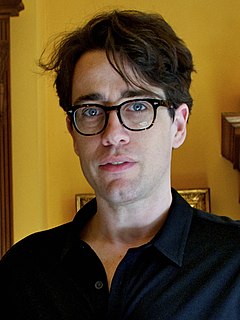A Quote by Adam Morris
Once I looked into it, I was taken aback to learn that pretty much nothing by João Gilberto Noll was available in English translation. I was confident that I could find an editor and the readership for a translation: Noll is highly respected in Brazil, and at the same time divisive, somewhat like Hilda Hilst. Neither of them enjoys the universal acclaim you might associate with Clarice Lispector, whom everyone adores, myself included. Still, I considered it a tremendous injustice that Noll had not been more widely translated and was determined to rectify it.
Quote Topics
Acclaim
Associate
Available
Been
Brazil
Confident
Considered
Could
Determined
Divisive
Editor
English
Everyone
Find
Had
Highly
Included
Injustice
Learn
Like
Looked
Might
More
Much
Myself
Neither
Nothing
Once
Pretty
Readership
Rectify
Respected
Same
Same Time
Somewhat
Still
Taken
Them
Time
Translated
Translation
Tremendous
Universal
Whom
Widely
Related Quotes
With My Dog-Eyes by Hilda Hilst got more exposure and reached far more readers than I ever expected. Even my editor at Melville House, who championed the project form the outset, told me she was surprised by the response. After this, editors began asking my opinion about which Latin American writers ought to be translated. I realized I had some cultural capital to spend, and I wanted to use it to introduce another author who might be considered a risk by conventional publishers. Michael Noll was at the top of my list.
The Brazilian national identity is not one of João Gilberto Noll primary concerns. This does not mean social critique is absent: race, gender, and class relations are considered in Quiet Creature. And these are universal relational matters, not necessarily particular to any country. Some critics have commented that understanding the specific Brazilian political context of the novel is helpful for reading Quiet Creature. This may be true, but it's not prerequisite for understanding it.
Jorge Luis Borges had the soapbox and the authority to complain about this myopic understanding of the duty of Latin American writers, which sometimes forecloses their unique modernism and experience of modernization in favor of a mythic past or an artificially constructed ideal national subject. So likewise in João Gilberto Noll, readers shouldn't expect samba and Carnival and football. The Brazilian national identity is not one of his primary concerns.
I don't speak any languages well enough to make an expert assessment on writing in translation, but since I'm interested in awkwardness in prose, I find I like the way translated texts can sometimes acquire awkwardness in the process of translation. There's a discordance translation can create which I think is sometimes seen as a weakness but which I think can be a really interesting aspect of the text.
Some stories I write in Swedish, some in English. Short stories I've almost exclusively written in English lately, mostly because there's such a small market for them in Sweden and it doesn't really pay either. So, the translation goes both ways. What also factors in is that I have a different voice in English, which means that a straight translation wouldn't be the same as if I'd written it in English originally.

























